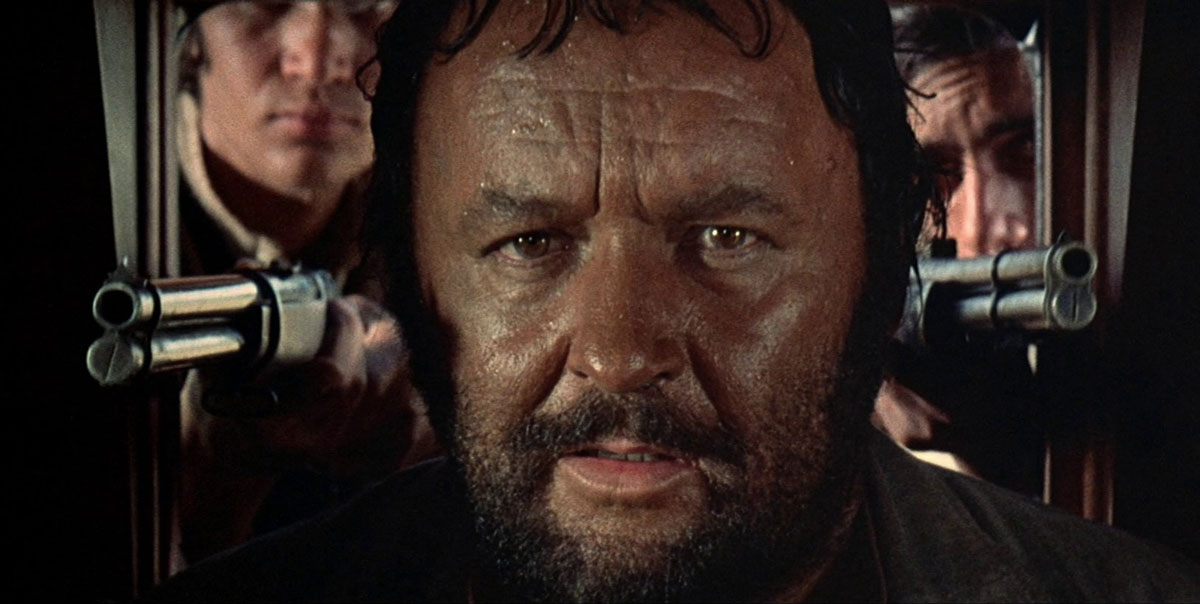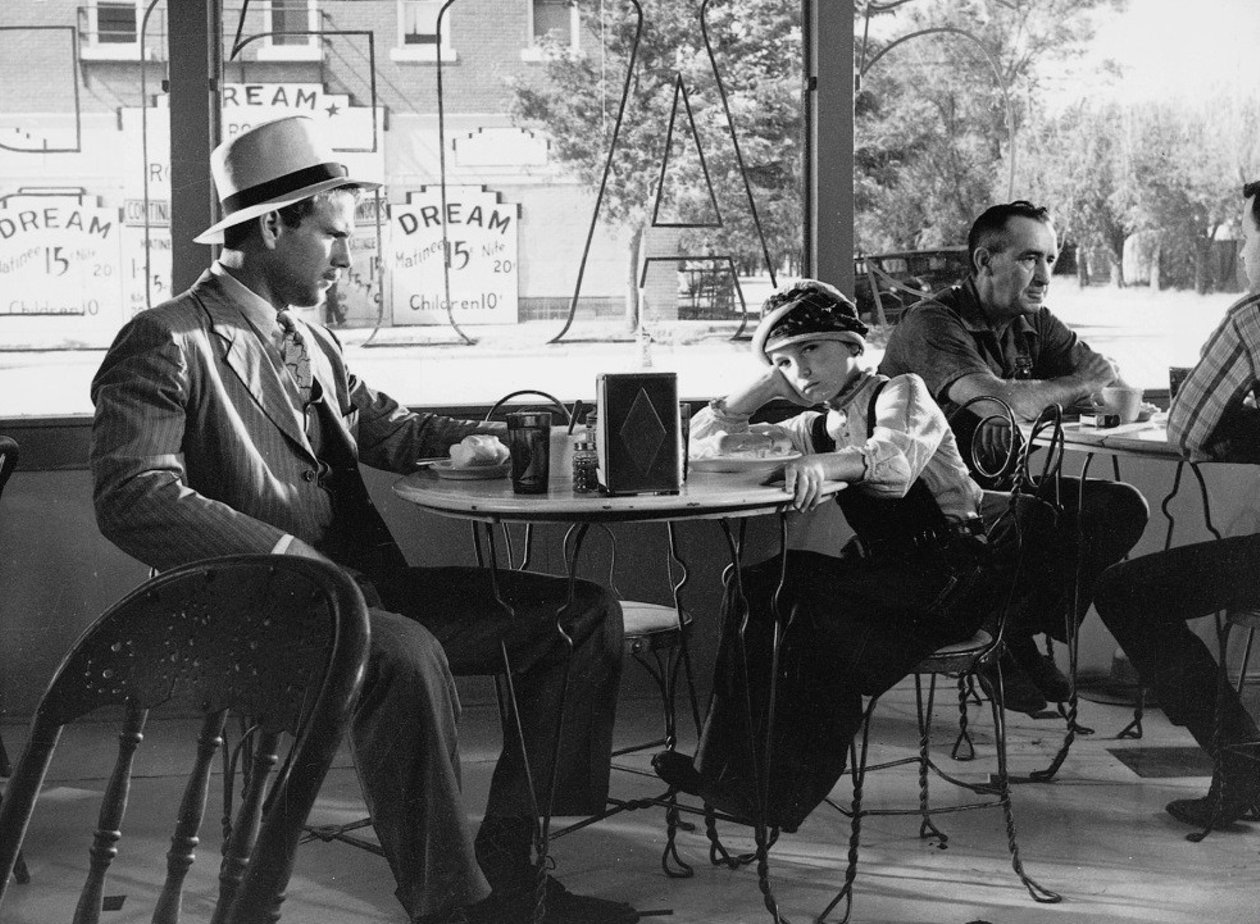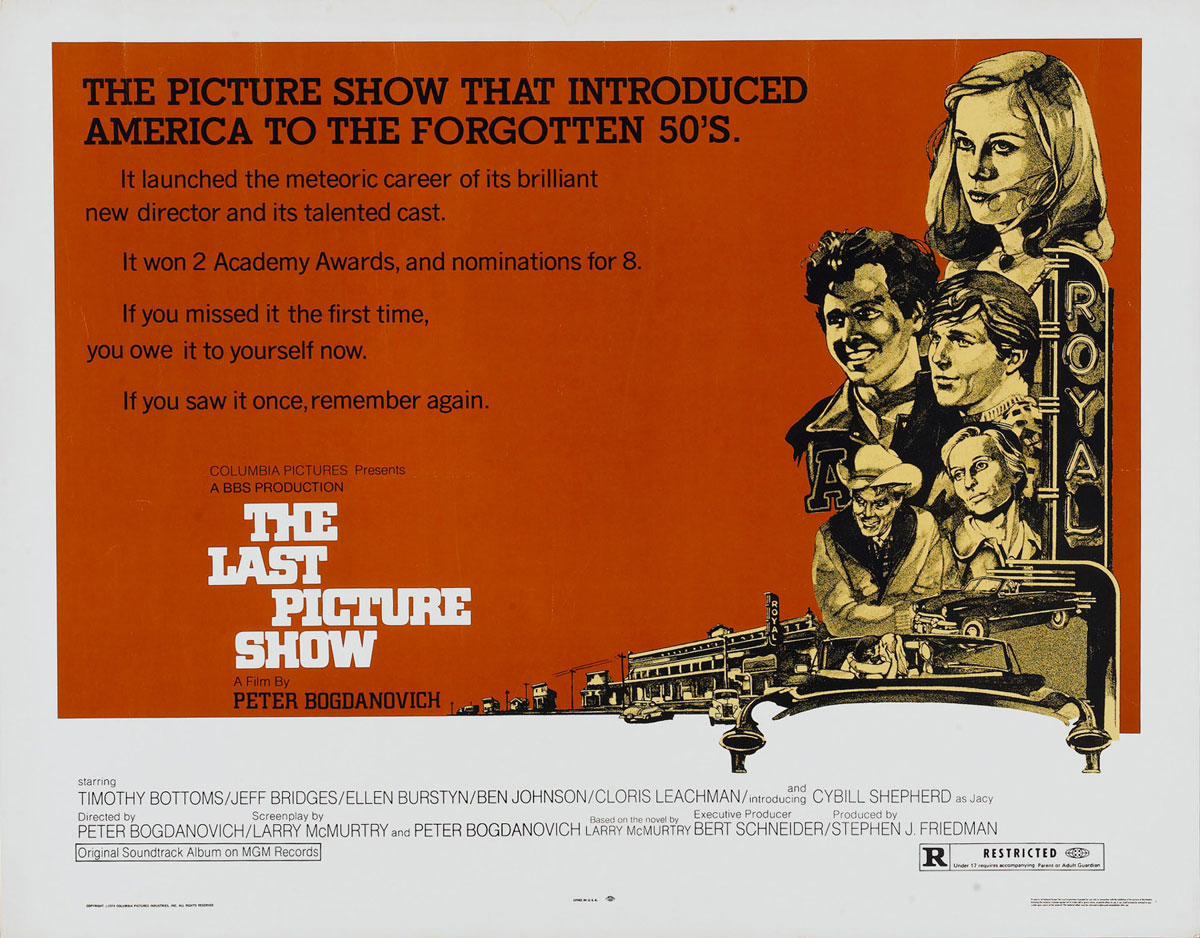TWO BEEG GREEN EYES
by Peter Bogdanovich
My experiences with Leone prove that directors should never collaborate. It is, as Mailer has described it, a totalitarian job.
An American actor I know once had a passionate romance with a Russian ballerina, though neither of them spoke the other’s language, and it lasted just as long as they didn’t know what they were saying to each other; as soon as they did, the affair terminated abruptly. Strangely enough, the language barrier between director Sergio Leone and me didn’t have quite the same result, though probably if we’d understood each other from the start, I would have seen less of Rome than I did.
This all happened in late 1969. Leone, the father of the spaghetti Western (the Clint Eastwood ones beginning with A Fistful of Dollars) and the padrone of the extreme close-up, had, through United Artists, asked me to direct the first movie he was to produce only, rather than direct and produce. With assurances from U. A. that they would welcome radical changes of the first draft of the Mexican Revolution script I had received, and firm promises that Leone would really function only as producer and therefore leave me to make the film as I saw fit, and taking into consideration that it was a free trip to Italy, where I’d never been, and bearing in mind that I hadn’t made a picture for well over a year, that three projects I’d been preparing had fallen through, remembering too that a baby had just made us three and that the specter of having to go back to writing articles was hanging over me, I accepted, you might say, reluctantly.
In those days, Sergio didn’t wear a beard; in fact, he was a rather unimpressive looking guy—medium height, pot belly (usually with a cashmere sweater pulled down tight over it), hardly any chin to speak of. But he met me at the airport with the majesty of a Roman emperor expending a bit of largess on a worthy, if nonetheless decidedly inferior, underling. It was subtle, the feeling behind that first meeting, but the impression was confirmed in the weeks that followed. Actually, Sergio wanted me to believe he was a great director; he didn’t believe it, which is perhaps why it was so important that those who worked for him did. I had only just liked a couple of his movies, so it was a difficult act for me to play, though for a while I tried to imply admiring thoughts in the way I said things rather than in what I said, most of which I guess was negative.
Luciano Vincenzoni, the writer of Leone’s two best films (For a Few Dollars More; The Good, the Bad, and the Ugly), had been hired to work on this one too, and he and I got on famously right from the start, though his job was the not very appetizing one of being translator, mediator, arbiter, and scenarist all at once. Luciano, by the way, is everyone’s ideal Italian—he could be exported as a tourist attraction—charming, gracious, enthusiastic, good-looking, and funny. For some reason best known to himself, he really wanted me to direct this picture—a lot more than 1 did—and much of our time alone together was spent in his trying to get me to be more politic with Sergio. Our script conferences were usually called for 11 a.m., at which time I would arrive at Luciano’s apartment and we would wait for Sergio. Around one o’clock he would call to say he’d be a little late so why didn’t we go out and have some lunch. About three o’clock we’d return and Sergio would arrive promptly at 4:30 for two hours of work. After a couple of weeks of this, Sergio inexplicably presented me with a watch (an old one of his)—presumably to keep him from being late—a joke I made and Luciano says he translated.
Anyway, the conferences would usually begin with my complaining about the title of the film, which was Duck, You Sucker! (The men at U. A. had assured me it had to be changed, though I don’t believe they ever bothered to tell Sergio this; but then they probably didn’t refer to him as Benito to his face either.) Sergio would carefully explain that “Duck, you sucker” was a common American expression, to which I would reply that personally I’d never come across it before. I would then point out that the substitution of an “f” or the transposition of the “s” could result—in English, anyway—in some rather less than polite expletives. In answer, he would say that this title was in his view an Americanization of a well-known Italian expression, “Giu la testa, coglioni,’’ which literally translated means, “Duck your head, balls,” and which he intended to use as the Italian title, with the ‘‘coglioni’’ part left off. I said the idea sounded splendid, but that while this Italian saying probably received immediate recognition from his countrymen, “Duck, you sucker” would not have the same effect on Americans. Well then, he would say—this conversation really did happen more than once—what was a comparable American expression? I replied that I couldn’t think of one quite as colorful, but that we were known to say things like, “Watch it!” or “Hit the dirt!” or “Heads up!” or “Look out!” or even, simply, “Duck!” This was met with incomprehension and distrust from Sergio, who I’m sure was becoming convinced I wasn’t a real American at all.
Most of our time, however, was taken up with plotting. Sergio would begin each new sequence with a rush of English and much acting, all of which he did in the middle of the room accompanied by dramatic gestures. “Two beeg green eyes!” he would invariably begin, one hand leveled above his eyes, the other below to indicate what we would be seeing on the screen—a shot I could easily picture, as I’d seen at least a score of them in every Leone movie. “Cut!” he would continue. “Foots walk!” And all attention would now focus on his feet as they moved purposefully forward. “Clink, clink,” he would say, providing the sound effects for the spurs. “Cut!” he’d yell this time. “Hand on gun!” he’d whisper, grabbing his hip. “Cut!” Hands would zip back to frame his face. “Two beeg green eyes!” and so on, until a burst of gunfire sent him reeling into an armchair, spent and panting, both from the physical exertion so soon after eating (in Italy, and particularly with Sergio, almost any time of day is soon after eating), and the pure inspiration of the sequence itself. He and Luciano would look at me for a reaction, which early in these conferences I would attempt to make one of enthusiasm but which inevitably moved into something closer to exasperation. After all, it had always been my assumption that a director planned out his own sequence of shots, and I had the distinct impression that Sergio expected me to shoot everything just as he was acting it out. The climax of this particular part of our negotiations occurred late one heavy afternoon at Sergio’s home (sometimes to avoid waiting six hours for Sergio, Luciano and I agreed to drive the hour it took to get to his house in the suburbs and work there instead). Sergio had just begun a fresh scene—“Two beeg green eyes!”—when I interrupted to say that I wished we could just discuss the action instead of the shots and, besides, I didn’t like close-ups anyway. When this had been translated, there was an amazed and deflated look on Sergio’s face. A long pause followed. If I didn’t like close-ups, he finally asked just a bit ominously, what did I like? To which I perversely replied, “Long shots.” Driving back to the city, Luciano shook his head in wonder. “You are crazy,” he said. “This man make his whole career on the close-up and you say you don’t like the close-up. I think you don’t want to do this picture.”
But my favorite story conferences began with Sergio making a dramatic and terribly serious entrance—six hours late—and warning us not to forget that the movie we were making was really about Jesus Christ. I believe this was occasioned by a new set of reviews Sergio had read from France or the American avant-garde which searched out the hidden religious symbolism and significant nuances in his latest film. Once Upon a Time in the West. For over an hour, at least once a week, therefore, Luciano and I had to listen to a lecture on how the Irishman in this movie, Duck, You Sucker!, was really a metaphor for Christ. Luciano had to listen, that is, since the lecture was in Italian, and after the first time or two, he spared me the translation. I would usually place my hand on my brow, meditatively, in order to shield my eyes in case they inadvertently closed for too long a time.
Luciano would eventually bring Sergio down to earth and things would liven up. The best times were spent watching Sergio act out his most cherished moment in the picture, which had to do with the Mexican bandit passing wind while holding a lighted match to his posterior. Sergio particularly relished making the sound both of the initial departure of wind as well as of the subsequent one caused by the meeting of visible match and invisible gas. After acting it out in splendid detail, Sergio would collapse in sad exhaustion in his chair, shaking his head about the pity of not being able to do this on the screen, at the same time threatening to do it anyway. If there had been a great deal of this sort of thing one day, it was invariably followed the next by a sobering account of the film’s actual religious import.
I had left Los Angeles in October, planning to stay abroad until at least April to make the film. I was home for Christmas. In a recent interview in Oui, Sergio remembers our brief association a little differently. In his version, he never even saw my first film (Targets), which had, in fact, been the very reason I’d been hired. But then, in his recollection, my only job was as a writer, concluding that, naturally, he had rejected the terrible draft I had handed in after petulantly refusing to accept any of his ideas. Actually, I didn’t physically write a thing, nor had I ever been asked to. Luciano had to do that, poor fellow, and I’m afraid I ran when I read the result of our few weeks of work. It was a Sergio Leone movie without a doubt, and that’s who should be directing it, I told U. A., which is ultimately what happened, though Sergio first found a young Italian director to take my place. To be honest, I think Sergio was about to fire me when I left, having no doubt decided by then that I was going to shoot the entire film in long shot. As it turned out, however, after two weeks of Leone’s pushing buttons on his Italian surrogate, the stars, Rod Steiger and James Coburn, refused to accept the situation, and so he finally had to direct it personally.
This year, a similar thing happened when Sergio hired an inexperienced Italian fellow to direct another Western, My Name Is Nobody, with Henry Fonda. After a while, circumstances again forced Leone to take over, though finally, I’m afraid that’s what Sergio wants; if the picture then turns out to be a bomb, he has the excuse that it was not really his plan to make this one and that he’d been forced to come in and do the best he could, at the same time postponing the major work he was preparing. In other words, exactly that crisis of self-confidence I had suspected four long years ago. When all those critics and people say you’re good and you don’t really believe it, at some point perhaps the thought of being found out becomes overwhelming and you would rather retire undefeated than face failure. Actually, if this perhaps presumptuous deduction is true, it is a considerable pity, because Leone is often a very good director. My experiences with him prove nothing except that directors should never collaborate. It is, as Mr. Mailer has well described it, a totalitarian job. And Duck, You Sucker!? Well, after an initial release failed to spark much interest, a quick title switch was made to A Fistful of Dynamite, but that didn’t help. The French critics loved it, though, as did several American ones. I quite liked it myself—all but the serious parts. I had enjoyed those more when Sergio acted them out himself.
Published in New York Magazine, November 26, 1973



